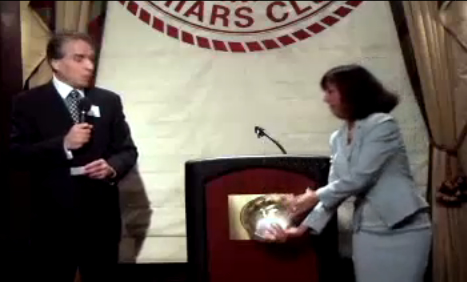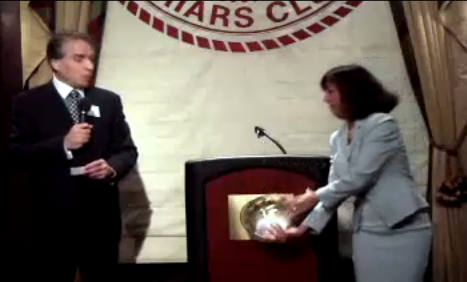Whenever you're presenting, you're going to make mistakes. Sometimes the mistakes you make on the public speaking platform result from commonly held myths. At other times, mistakes might stem from ignorance or inexperience. Whatever the case, here are some of the most common mistakes speakers make.
I'm not a public speaker
Reality: We all speak in public. Public speaking goes far beyond standing on a stage in front of 100 people. We're presenting ourselves all the time. In fact, life is one big presentation.
Don't talk with your hands
Reality: Expressive, dynamic speakers use their hands. Speakers who don't use any hand movement appear stiff. So let your hands speak for themselves!
Look over the heads of the audience
Reality: Look directly at key individuals. We connect with each other through our eyes. Effective speakers look at a few people, one at a time. This creates a relationship, and it's less scary giving your message to each person than to a large crowd.
Memorize your speech
Reality: It's more effective to memorize concepts, not words. If you forget a word, you can make your point another way or go on to a new point. Your audience will not know the difference. When possible, avoid using manuscripts. Notes and outlines will better help you to stay on track.
Stand in one place
Reality: Purposeful movement can be dynamic. Watch some of the top motivational speakers, like Zig Ziglar, Tony Robbins, and Les Brown. They work the crowd. They move across the platform. By doing this, you'll increase the energy in the audience.
Always use a lectern
Reality: There's only one reason to use a lectern: to hold your notes. Use a lectern only when you have to speak from a manuscript. Otherwise, you risk giving a presentation that will be perceived as formal and stiff.
Cover all your points in your speech
Reality: Consider the time frame and modify your talk. Give three major points instead of six. Condense your examples. Tell shorter stories. People will be more likely to remember your speech if you take this approach instead of trying to squeeze too much into too short a window of time.
Start with a joke
Reality: Don't do it. You don't have to be funny to be effective. Use humor or irony instead of telling a joke. Or, simply start with a story or a quote. Throw away the jokes. More often than not, they backfire.
Shut the light off to show slides
Reality: In total darkness, your audience members will fall asleep. And they'll be startled when you turn the lights back on. Use a dimmer instead. Give people enough light to see the slides, and be sure you can see their faces as well.
You shouldn't be nervous Reality: You can control and manage nervousness, but you can't eliminate it. For most of us, the fear of making a presentation never really goes away. Even the top speakers get nervous. But some nervous energy is good for you. It keeps you dynamic. The goal is to channel your nervous energy into a positive performance.
--------------------------------------------------------------------------------


